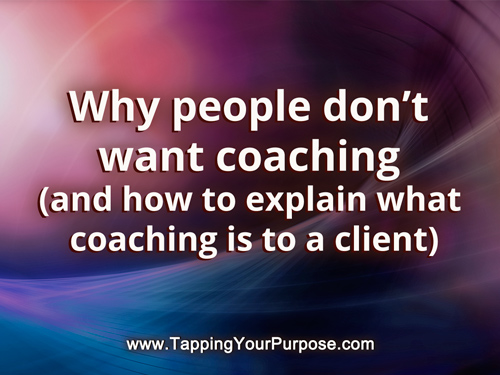
Imagine for a minute that you’re at a neighbors’ barbecue and have to introduce yourself to a group of total strangers.
Say you’re a surgeon. Say you’re a lawyer. Or -like me years ago- say you’re an architect.
People understand that.
They will picture you in a green gown, surgeon knife in hand, ready to do your thing. Or they’ll picture you in court talking to the jury, defending a case. Or they’ll imagine you sketching a house on a drawing board full of rolled blueprints.
People get that. It’s easy. They’ve already seen it.
But tell them you’re a coach and notice the confusion in their eyes. I never got the blank stare when I introduced myself as an architect. But…
People don’t understand what coaching can do for them
Let’s talk about the elephant in the coaching room, shall we?
We’re told that coaching is such a great career, that we can live our calling of helping others, that with coaching we can transform people’s lives.
What they don’t tell us is that filling our coaching practice is going to be hard.
Because most people don’t understand what coaching is. And this is a big problem because…
… people don’t buy what they don’t understand.
What do people really want?
People want solutions.
We all have a goal, a dream, or a problem that is bugging us. We want specific results, and most of us need help to achieve them. But the process of getting there? It feels like an obstacle we’d rather avoid.
And that’s true also for the other, more common, professions.
Just think of this for a moment.
Nobody wants surgery. Right? We want to recover our health. Nobody wants to be in court. We want to solve our legal issues and recover our peace of mind. Nobody wants a blueprint. We want to live comfortably in our dream house.
So do people want coaching?
”-Thank you but no thank you.”-They are thinking- “I’m not interested. I just want to get thinner, to get along with my spouse, to find a new fulfilling career.”
The problem with offering free coaching sessions
Aware of this problem, -that people don’t want coaching– some coaching schools trained us to give free coaching sessions.
“If they don’t get the value of coaching, we’ll show them” it’s the rationale. “We’ll give them a taste of it.”
And there we go, offering free coaching sessions to everyone willing to try them.
How well has this worked for you?
Personally, I’ve had people not show up for the free session without even letting me know in advance. I’ve had the, “Oh! That was interesting” but-never-to-be-heard-again person. And I’ve finally had the realization that a single session could never convey how transformative coaching can be.
So I stopped doing them.
And I tried a different way.
The unusual way to make coaching super easy to understand
What if we stopped talking about coaching -because people don’t want it- and started talking about what they really want instead?
When I stopped talking about coaching and started talking about what they wanted, things started to change.
This is how you can do it, too.
- Identify some ultra-specific result that you can help others achieve.
- Create a coaching program, online course, or workshop that is designed to take people from where they are to where they want to be.
- Give your coaching program a clear, specific, and tangible name connected to the result.
- In your articles, website, social media sites, start talking about the result you help people achieve with your program.
So do I mean don’t ever offer free sessions? Not exactly, because giving free sessions to individuals, or a free introductory workshop to groups, is still valuable. They get to experience what it is to work with you, and a taste of what coaching is.
But make sure the session is focused on helping them achieve a specific result.
Again, don’t offer the generic, typical, uninteresting and unfocused, “free coaching session”. Make it more specific. What would be the first step they need to take towards their goal?
In your free session help them take that first step, and then show them the birds’ eye picture of what it takes to achieve their goal. Then offer to support them through that journey with your program.
And if they say yes, coach them all the way to their dream goal.
You’ll be coaching clients without even mentioning your “secret tool”. Because when people know exactly what you are helping them achieve, they see the value of getting your help.
So now I’m curious, What result do you feel inspired to help clients achieve with your coaching program?
